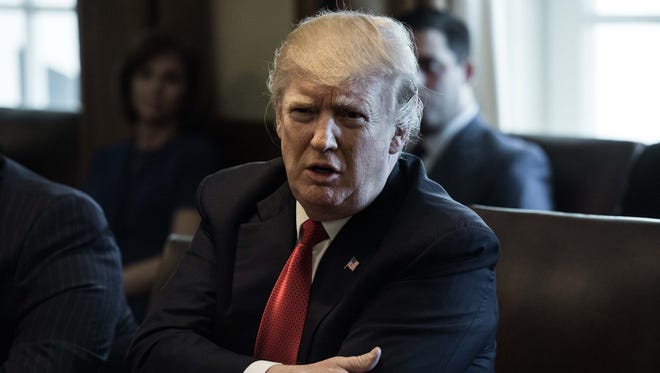Trump White House ponders way forward as troubles mount

WASHINGTON — President Trump, his aides, and their allies are pondering a variety of ways forward in the wake of last week's defeat on their first attempt to roll back President Obama's health care law.
Tax reform? Infrastructure? A temporary spending plan? Maybe even another crack at health care?
While critics question the administration's focus, or lack of it, Trump officials said they are working on what he promised during last year's campaign.
"All of these are important and have been priorities that the president laid out months ago," White House spokeswoman Sarah Sanders said, adding that officials are meeting and talking about "the best path forward."
Tax reform will be a major topic at a Thursday meeting of the National Economic Council. Administration officials have discussed pairing a tax reform bill with an infrastructure plan in an effort to attract more congressional support, including Democrats.
"We're in the beginning phases of both of those," said White House press secretary Sean Spicer.
Trump himself revived the idea of a health care bill during a reception Tuesday night for Republican and Democratic lawmakers at the White House.
Read more:
President Trump's donors launch ad campaign to boost his presidency
Sean Spicer and April Ryan kick off briefing with cordial greeting
Democrats fear Obamacare attacks, not outreach, from White House
Less than a week after the House GOP pulled an alternative to the Affordable Care Act because of opposition from conservatives, Trump appeared to reach out to Democrats by saying that "I know that we are all going to make a deal on health care."
Many Democrats, however, said they would not work with Trump unless he agrees to give up plans to repeal the law, something the president pledged to do during his campaign. And Senate Republican leader Mitch McConnell said the House's inaction means that Obamacare will remain the law for the foreseeable future, and "we are just going to have to see how that works out."
Impending government shutdown
In the meantime, the administration needs to work with lawmakers on a temporary spending bill or face the prospect of a government shutdown on April 29.
Hovering over all of this: various investigations into any Trump team links to Russian attempts to influence last year's presidential election, not to mention presidential approval ratings in the mid-30s.
Spicer said there's "no connection" between the White House and Russia, and that the president and his aides are working "to fulfill those pledges and promises that he made, to bring back jobs, to grow the economy, to keep our nation safe."
Given the political and logistical challenges, some analysts are skeptical that Trump can secure his big agenda.
"I have my doubts," said Rick Tyler, a former Ted Cruz campaign aide who is now an MSNBC political analyst. "They seem incapable of getting on track."
Tyler did say that combining tax reform and infrastructure could help the administration leverage some Democratic votes in Congress.
Nobody's home
The Trump administration also faces another challenge: lack of people.
The Partnership for Public Service, in collaboration with The Washington Post, has identified 553 "key administration positions" in the executive branch requiring Senate confirmations; 491 of those jobs are still awaiting nomination. Another 41 people who have been nominated and are awaiting Senate confirmation, while 21 have been confirmed and are serving.
Trump's nominees for secretary of the Army and Navy have both dropped out.
Republican consultant Bruce Haynes, founding partner of Washington-based Purple Strategies, said Trump and his aides need "experience and patience" moving forward. He suggested that Vice President Pence — a former House member — and his aides could play a bigger role in negotiations "over less experienced people in the administration when it comes to working with Congress."
As for patience, Haynes noted that it took the Obama administration more than a year to get its health care law passed. "The idea that it could be repealed and replaced in sixty days was a pipe dream sprinkled in pixie dust," he said. "Major legislative initiatives take time."
Former Trump campaign aide Michael Caputo, meanwhile, said that "I'm not as pessimistic as most," citing Trump's early moves to reduce government regulations via executive order. Caputo said business leaders like Trump's plans because "there's a lot going on with the job creation agenda ... I see them focused on jobs."
Liz Mair, a Republican consultant involved in the "Never Trump" movement during last year's campaign, questioned the administration's ability to win major legislation out of Congress, and said it should focus on smaller, easier-to-pass items. She said examples could include bills designed to address rising drug prices, reduce financial regulations imposed by a Democratic Congress via the Dodd-Frank bill, and cope with opioid abuse crisis.
When it comes to big ticket items, she said, "the prospects of failure are very, very high, and they need to bank wins now."
Read more:
The first 100 days of the Trump presidency
